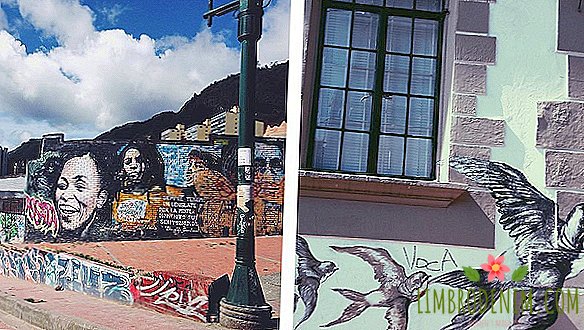Terribly interesting: How I went to Colombia to teach children
I made the decision to leave Russia in August 2014, when, after a serious illness, she took a ticket and went to Nepal. In Moscow for me at that time, little was happening, and it seemed to me that I would not lose anything if I stopped for some time and decided what I wanted to do next. In Nepal, I taught English for free at a school for disabled children and children from low-income families, and also naturally laid bricks - when you build the real building, which I learned recently, suffered because of Nepalese earthquakes. After spending several months there, it became clear that I didn’t really want to come back to Russia, therefore, having jumped around the countries (Turkey, Georgia), I went to Bogota, Colombia to teach children English according to the program of the Colombian Ministry of Education.

People who get here are usually divided into two types: fall in love with some local / local or get stuck after traveling through Latin America. Both types are united by incredible adventurism - everyone knows about Colombia except the sad story about drugs, a little bit about Shakira (they don’t like her here), Gabriel Garcia Marquez and, perhaps, football for the most seen. However, the people who remain are grouped into "don't dare offend my Latin," "free here," and "transit point with prospects." I am the last. The first two months in Colombia characterize my Facebook status well on my arrival in Bogota: “Every ten seconds I squat at a point.” To say that it was scary and dumb is to say nothing at all. I have never in my life encountered so many aggressive homeless people, widespread theft, murders on a nearby street, public beatings and disabilities, as well as unpleasant looks from not very pleasant local incomprehensible species. At that time I was studying the city, so fear was strongly correlated with topographic illiteracy. It is now that I am wandering through dark areas, visiting my former students, and then strenuously pretended that I accidentally dropped in here, and I don’t have an iphone, “money, what money?”, And, of course, no skirts and heels. Three months later I recognized the city, and the city finally accepted me: the builders pulled two gold rings from my room, which were presented to me by a friend who made jewelry. At that moment I exhaled, and everything went like clockwork.
There were no problems with work, since I was traveling purposefully according to the program with a ready-made annual visa. I was assigned to a school in the south of Bogota, and six months later - to a school in the district of Santa Fe, which the locals call El Bronx based on what district it is clear in which city. Children are the same everywhere, except that Colombian children are more emotional and open: feel free to cry out loudly if, in their opinion, you don’t pay enough attention to them, or don’t embrace too much and don’t kiss them too gently. Due to these working conditions, I was sick three times, although not much: when you need to kiss all of your students, it is not surprising that they send viruses to you with love.
It was very easy to work: the ready-made programs of the British Council, a personal curator from the local ones, who would help, the two responsible for the school and a huge crowd of exactly the same teachers as you, from all over the world. So began a period of rampant socialization, to which we must be prepared, otherwise you can simply die from sadness: Colombia is a country of free time, cheat chats and the omnipresent "manian" (translated from Spanish "tomorrow"), when instead of "no" you are sent to the future.

Communication culture
Since my favorite language is English, for six months I have developed a stable social circle of expats, as well as fearless Russians, direct incarnation of all stereotypes existing about us. I don’t have a friendship with Colombians because of the language barrier, since I don’t really like Spanish, but most of all because of their speech etiquette, which is directly opposite to my habit of doing business. Colombians are terribly polite people, using a huge amount of speech constructions aimed at striving to seem nice to you, with a complete lack of aggression. It is quite normal to be late for meetings, because on the way you are obliged to embrace with all your friends and ask about their health, as well as the affairs of their families.
The first month I was terribly angry by the inability to plan my life, because when I got involved with the plan, the local plan always failed. Then I began to appear everywhere half an hour later and still was the first, and also let go of control: it is impossible to go crazy every time something goes according to plan. You can not aggressively respond to things that did not turn out due to the fault of some people, because it does not solve the problem. It is necessary to think very hard how to build a phrase in order to get from people who are not used to deadlines what you want. Since I am a rather aggressive person, it is difficult for me to give it, but it is given: in the year of life everything here has come into harmony, at the same time it does not have to pretend that you are better than you are. If you put on a mask for a long time, it becomes part of your personality. Here it is enough to follow certain social canons, and in the remaining free time, which is very much, be yourself. I think this phrase can describe the mentality of Colombians as a whole.

Life in colombia
As a rule, people who want to explore a country travel a lot and communicate with local people. This approach is bearing fruit, but I believe only in numbers. When I needed to understand something about the mentality of Colombians, I began to study their economics. Colombia was lucky with the Minister of Finance of the 90s, Rudolf Homms, who at one time introduced a liberal economy into the country with sane state control of agriculture, investment, and also export of what Colombia did well. Because of their close ties with the United States, they were lucky with investments, but they lost the plan to enter new markets. However, it is precisely this approach that still keeps food prices in Colombia at a surprisingly low level, and allows Colombians to engage in handicrafts.
Do not forget about shipbuilding, in which they are leaders in Latin America, about coffee, pop culture and sports, which they heavily export. If in Russia we sell oil in order to buy food for it, then here it is sold to buy technology for it. Therefore, in spite of the constant jump in the dollar against the Colombian peso, prices here have practically not risen over the year, since the Colombians themselves produce most of the products for life: clothes, shoes, electronics. There is a huge selection of local cosmetics, which is just in the middle between luxury and mass market, so local women who are obsessed with beauty even more than women in Russia can afford to look good for ridiculous money.
Unlike most of my good friends who left Russia due to the fact that they fell in love with some city or country and were determined to live there, I, unfortunately, do not possess such courage or faith in "the world gives you that you expect from him. " Colombia, in the majority of Russians living here, causes cognitive dissonance, and opinions are often so polar that you simply don’t need to believe (even me). For example, I have a favorite burger, where there is always good fresh meat and vegetables. I go there for a year, I know the menu entirely and almost every time I take the same thing. At the same time, every time the local cashier tries to shortcut me to 400-800 pesos (10-20 rubles) and every time fails miserably. There is nothing normal in this, but such persistence makes me sincere admiration and even amuses. In Russia, I would simply cease to go to such a place, and here I do not draw conclusions. Because in the barbershop I was poured local aguardiente vodka with the words "What a fire!" (it was all their English), they constantly give me some nishtyaks, and in general, I sometimes go there just to visit.
What is there to say? In Colombia, they steal? Yes. In Colombia, are people generous and disinterested? Also yes. The world gives you what you expect from him? Come here and see for your own dementia. For me, everything is simple. To say that Colombia is economically one of the most attractive countries at this stage will be absolutely fair, and that is why I still live here: everything is relatively cheap, it is developing rapidly, and everyone needs English. However, the situation, including economically, is overshadowed by a high level of crime. So high that lying to parents about how good it is here becomes more difficult with each passing month.

Crime
Colombia is a country with an ongoing civil war. The reasons for this war differ and the Colombians themselves, but in general, described as follows. First, the very aggressive Spaniards came to the ancient, very aggressive Indian tribes and enslaved them. After several centuries of the colonial period, Colombia gained its independence and, against the background of delays in economic development, went through all political stages in one very fast and bloody period, which ended in confrontation between conservatives and liberals and resulted in the creation of military opposition groups, criminal syndicates and left-wing guerrillas. They still operate in the country, despite the enormous international efforts to eliminate them. Approximately 220 thousand people died in this conflict, of which 170 thousand were civilians. The latest news on the topic is the September talks between President Santos and the rebel leader Jimenez in Cuba, where they seem to have agreed to resolve matters peacefully, the FARC promised to cease hostilities, and most of the rebels were promised an amnesty.
Colombia seems to be an unprecedented example of an attempt to negotiate with terrorists, a country that has tried everything to stop the armed conflict between the government and the military opposition, and this explains many things in the Colombian mentality. Colombians are really very polite people, because their history has shown them that aggression gives rise only to aggression, and you need to carefully monitor the bazaar so as not to accidentally stomp. At the same time, they are able to turn from very polite to terribly aggressive in a second, as their peasants in their time had to take up arms and defend their territory unwittingly. Add to this the influence of drug cartels on politics and the real possibility of becoming a millionaire exclusively on coca plantations, adding to this the employment of a huge number of poor people on cocaine fields - and we get a Colombian who still remembers being killed in the nineties, at the same time wants a good life, but knows that a good life can be very short.
The absence of a change of seasons gives rise to a lack of ability to plan, because there will be no winter, situational decisions and petty daily crime in the form of widespread theft. In my school there were families of thieves, where my grandmother stole, my mother stole, and the son, who is ten, also steals, because for them it is a profession, like prostitution. Therefore, the most obvious solution for me was a condescending attitude to a huge number of things that I simply did not encounter in ordinary life in Russia and which I was not used to, such as the low level of education and the constant lies of everyone around to everything around.
Now I don’t carry a lot of money with me, I don’t show off on the street and I don’t solve street conflicts by cleverly. Here they kill for it, and although the situation is improving, the half-century war of all with all has taught the locals to constantly maneuver and look better than they are. Since I have not gone through these stages in history, it is easier for me to accept them and not to teach local life, because for this, thank God, there is still Facebook, and none of my local friends speak Russian.

Religion
Colombia is a Catholic country where love for one’s neighbor in all its forms has been elevated to a cult. This is expressed in an incredible amount of betrayal of husbands to wives and wives of husbands, machismo and pregnancies at thirteen. Now the situation is declining, thirty-year-olds are emerging, receiving a second degree and having no children, the church is gradually reducing its influence on the masses, but, it seems to me, the church also explains the lack of a friendship cult, as in Russia. It is not customary here to make friends, like ours, to help friends, like ours, because for this there is a family and a mother, and with all your cousins you are closer than ever to be with a stranger.
I think, to say that Colombians do not know how to be friends, will be too disrespectful towards an entire nation, but in fact I really avoid friendship with local girls. For the most part, they constantly compete with each other, discourage partners from each other who they do not need, find out relationships very loudly and live up to ninety years because they can afford to prydat on each other’s shoulder if something went wrong.
The Russian coldness and habit of holding back my feelings here, in fact, greatly helps to avoid fussiness, limits the influence of the church on your life, since I, although a believer, do not consider early pregnancy to be a blessing of the Lord, as everyone here believes. At the same time, it is Catholicism that often restrains the locals from trying to break into the grave, that in a country with such a crime rate it’s very easy, and when your mother scolds you, you are sad and correct.

Sport
The relationship of Colombians with sports is well described by the word "madness". In Europe, we believe that there are no more passionate people than the British, we know about their football hooligans, and any Russian football fan is usually well acquainted with the English league. As a last resort, Brazil and Argentina exist outside of Europe for the football world. Local fanaticism about football pushed me away from him, and although I attend football matches at the stadiums, and Santa Fe, for which I support, last year became the first Colombian team to take the South American Cup, there is a very clear bend with passion in relation to football. For Colombian commentators, there are no mistakes of their teams at all, here on TV they talk for hours about how such a judge screwed up and how “just unlucky” for someone. In 1994, in Colombia, the ex-defender of the national team was killed for having had the imprudence to score a goal during the game against the United States.
However, the most revealing story happened last summer, during Copa America. When Colombia played against Venezuela, I went with my Venezuelan friends to watch the match in the park of Bogota in the north of the city. A huge screen was installed there, and half of Bogota and we, ten people who were ill for Venezuela, settled on the grass. We did it very loudly, they threw us in the back and shouted loudspeakers in our ears, as a result of which, after the first goal, our friend said at the gate of Colombia that "we won't leave here alive." When Venezuela won, the local television company interviewed us, and my friend, when we loudly jumped and were happy with the victory, was whistled by the phone. That's about all you need to know about football fans here.
Similarly, Colombia is crazy about cycling, and for cyclists there is paradise: dedicated lanes, regular cycles for which they block traffic throughout the city, and all Bogotinians switch to bicycles and just ride. I hated cyclists in Moscow and successfully continue to hate them here. In general, my relationship with sports has only deteriorated.

Bogota
My Russian friend in Bogota, on our first meeting, told me that all the best places in Colombia are concentrated outside Bogota. This is true - the number of incredible places in terms of geography is amazing, there seems to be everything, even the jungle that I adore. But the fact is that I am an urban person and I really like to settle in the capitals. Bogota has become an ideal city for me. It is actually divided into three parts: the poor south, the center and the north for the rich. On paper, the city is divided into six estrato — peculiar districts that divide people, and into social classes as well.
This system was introduced in the 80s across Colombia, so that the poor, who cannot pay for water, gas and electricity, would not pay anything, and the rich would overpay twice for themselves and for that guy. It was introduced temporarily, but it still remains, which led to a unique situation that is not found anywhere else in the world: people were artificially divided into groups and began to define themselves according to their estrato, almost like a caste system in India. The system, created to help the poor, became a kind of trap for them - they do not try to get out of their estrato, because they are not used to paying for a better life. At the same time, their districts simply do not improve, they are ugly and dirty, and their hospitals and schools are overcrowded. I live in the historical center of Bogota Candelaria, that is, I enter into estrato 2-4. This area is adored by tourists, and most of the hostels are located here, because the colonial architecture after the pogroms is still preserved, everything is beautiful and relatively clean.
In Bogota, there is no “normal,” which I really like. Местные ненавидят её, примерно как Москву - вся остальная Россия, что, разумеется, для меня даёт Боготе несколько очков вперед. Она обладает всеми плюсами и минусами столицы, со стремлением заработать и с возможностями для этого.The people here are ironic and closed, which, in comparison with costeños, by people from the coast, is very striking, and therefore it is much easier for a person to live after Moscow, as I simply didn’t get used to the excessive manifestations of emotions and avoid them.
The cultural level of the capital is lower than Moscow, but here you can get enlightened for ridiculous money, and Colombian attempts to export their pop culture to the rest of the world tend to roll first in Bogota: if the locals accept, then the rest will like it. Therefore, a huge number of musical and theatrical festivals are held in Bogota, but the dance culture developed throughout the rest of Colombia is less apparent here: everyone likes to go dancing on weekends, but only few are able to do this, and usually they are newcomers.

After Moscow, any traffic seems ridiculous, there are traffic jams here, but they are not as monstrous as ours. Unfortunately, there is no metro here, instead of which there is a Transmilenio - always crowded buses, which, despite the allocated lanes, often also stand in traffic jams. However, there, as in our electric trains, you can hear local rappers and buy sweets, the main thing is to have time to go there, because here they do not let out those who leave before they naturally break in. I recognized the whole local mate that way. Bogota is unusual, retaining a balance between the ability to offer you the opportunity to relatively cheap and live well, find a job and not die on it. Although they work here six days a week, not five, they work very lazily, they always stop for coffee and do everything at the last moment. The level of corruption is just beyond the limit: if 20-30 percent are stolen from the budget everywhere, 80 or 100 are stolen here, it’s not for nothing that the metro has been built for so many years, because the budget has been settling in other people's pockets for the last ten years.
Such connivance of the local with respect to its administration works in the opposite direction: Bogota so economically jumped exclusively because the mayor’s office calmly looks at the gray private business, these endless stalls and shops, from the appearance of which the Moscow mayor’s office would have bought ten more bulldozers. The tax system is so chaotic that it is not clear who pays for what, and whether it pays at all, and this, in fact, is not really controlled by anyone, because it dies in pieces of paper at the stage of the bill.
I live in Colombia only because it is a country of contradictions, where everything puts me at a dead end. My curiosity about the local way of life provides food for the brain, lack of affection makes it easy to relate to many things that are unacceptable for me in Russia, for which I am always very worried. Since I’m not afraid of anything new, in principle, never at all, crime will never be a deterrent, and although I have strongly consented to many things, Columbia has not changed my character. I live in the historical center of Bogota, as in Stoleshnikov Lane in Moscow, only in eternal plus seventeen degrees. A man with a hat sings under my windows, I drink the best coffee in the world five times a day, doing what I love and doing charity. While this is all that I need for happiness.
Photo: 1, 2, 3, 4, cover photo via Shutterstock, Elina Chebbocha





